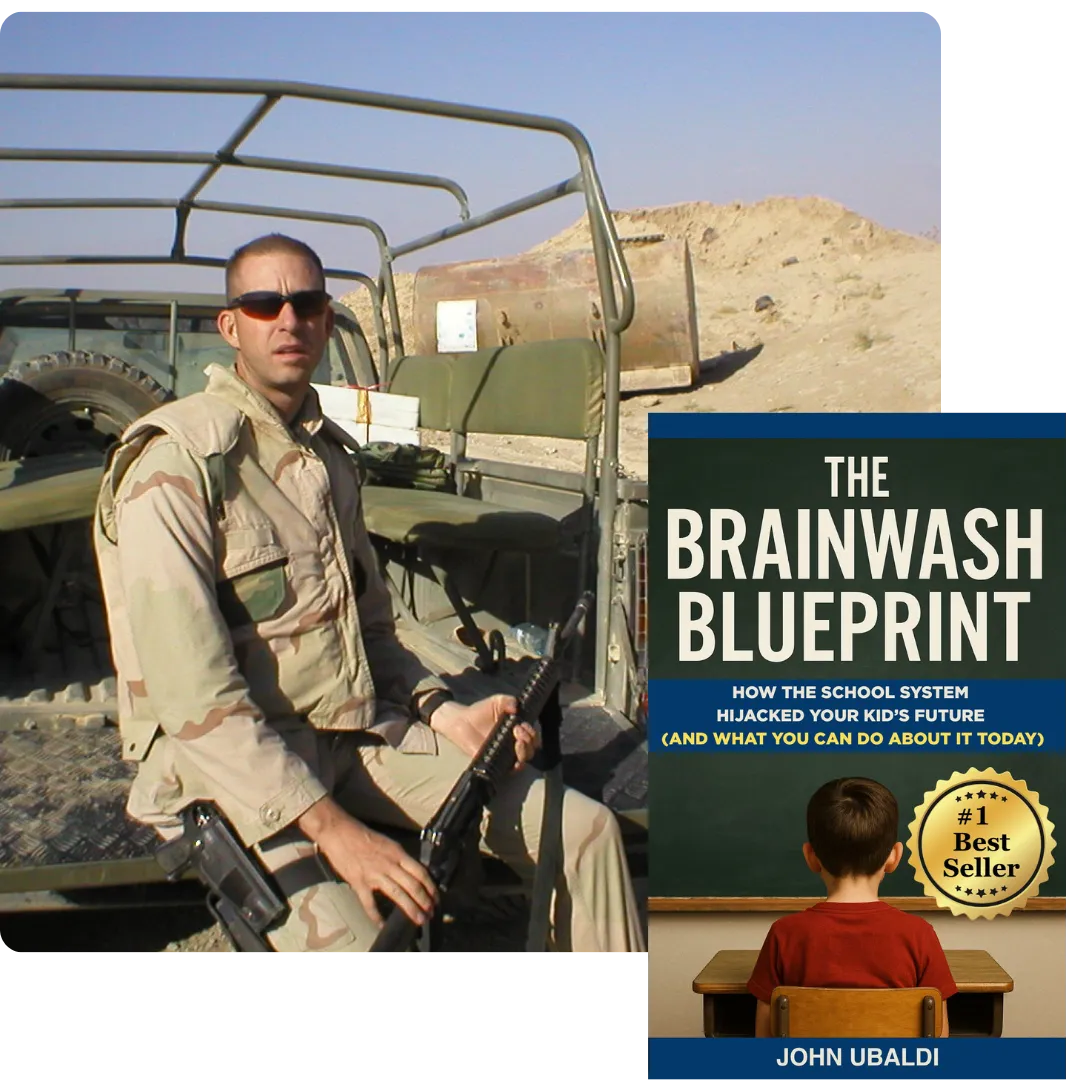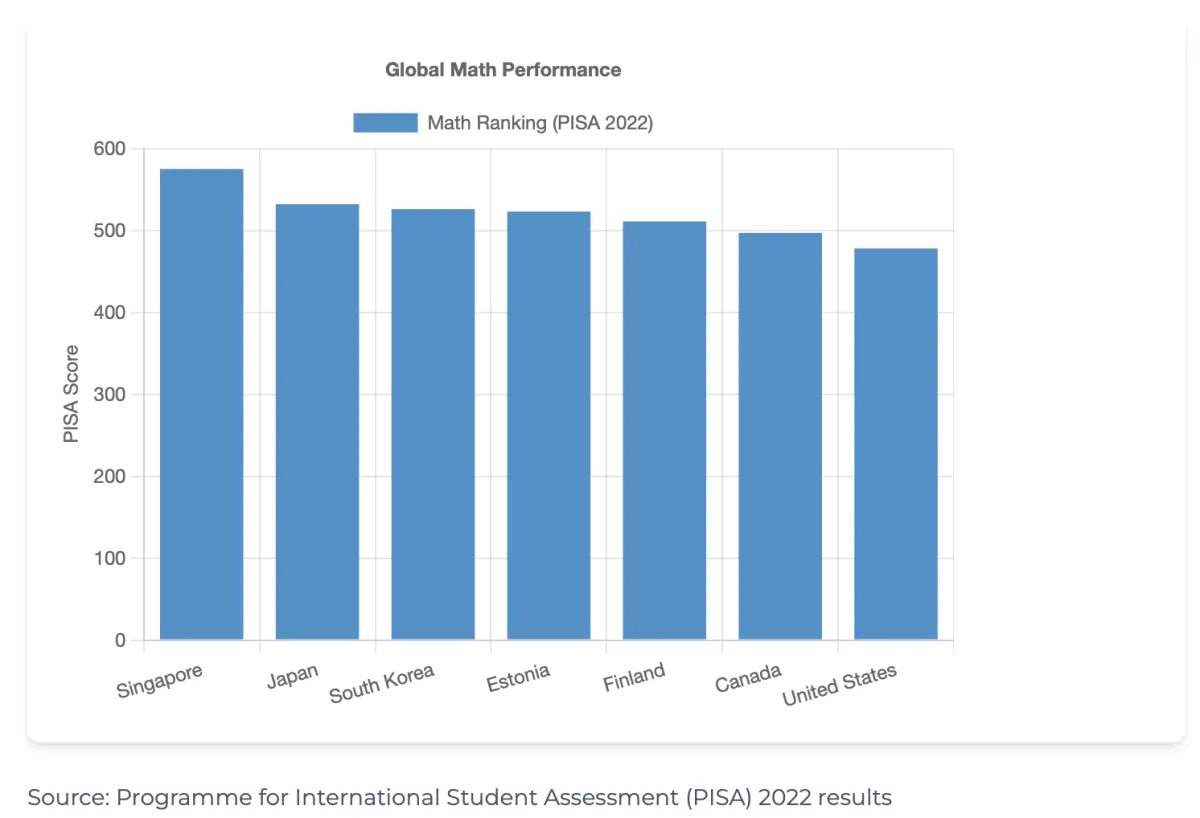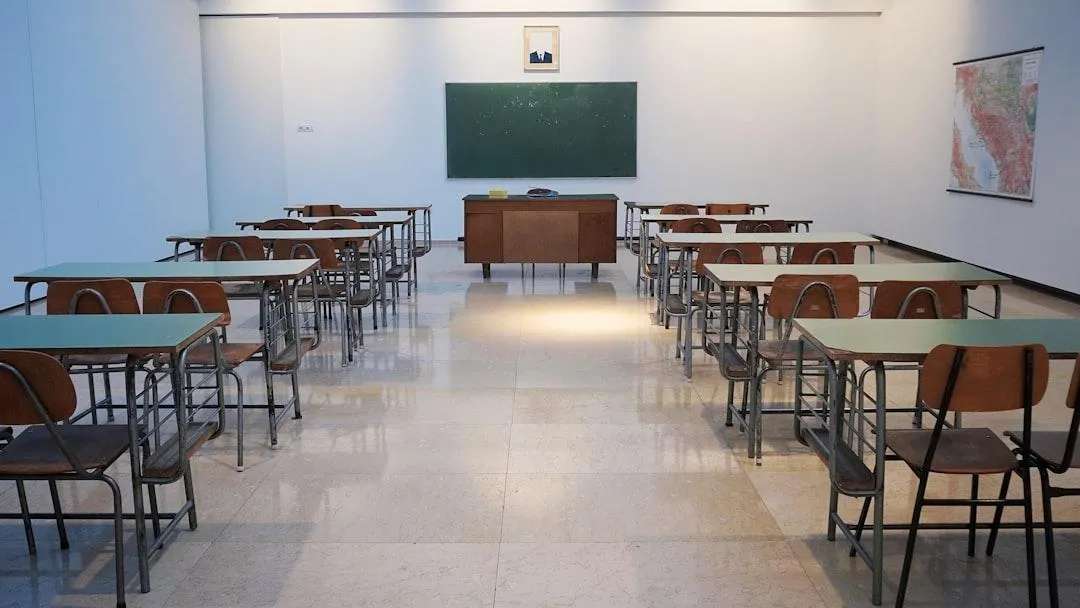John Ubaldi - American Education Expert
Transforming American
Education
John Ubaldi is dedicated to addressing the critical challenges facing American education and developing solutions for a better future.
"America's education system is facing unprecedented challenges. Addressing these issues is not just an educational imperative, but a national security concern."
- John Ubaldi

About John Ubaldi

Education & Background
Master's Degree in National Security Studies from American Military University
Bachelor's Degree in Government from California State University, Sacramento
30-year veteran of the United States Marine Corps
Three combat tours in Iraq and Afghanistan
#1 Best-selling Author
John Ubaldi is the president and founder of Ubaldi Reports, which provides credible, political content addressing domestic and global issues resulting in a well-informed and knowledgeable citizen that can take responsible action of their own choice.
As a 30-year retired veteran of the United States Marine Corps with three combat tours in Iraq and Afghanistan, John has become a foremost authority on Civil Affairs as it relates to Counterinsurgency and Irregular Warfare and is an author in various military journals.
John's expertise in education policy stems from his deep understanding of how educational systems impact national security and economic prosperity. He has dedicated significant portions of his career to analyzing the shortcomings of the American education system and proposing concrete solutions.
Works by John Ubaldi
Reviews on John Ubaldi's Work:
★★★★★ - "John Ubaldi's insightful breakdown of the great power competition is unmatched."- Rusty
Reestablishing America's Global Power offers a timely and incisive exploration of the United State's role in shaping the complex geopolitical terrain of today. Author John Ubaldi takes a contemporary analysis exploring the foundations, motivations, and consequences of American diplomacy in world affairs. One of the book's strengths is it's balanced treatment of America's military, economic, and cultural influence. While not shying away from critiques of American interventionism (e.g., Iraq and Afghanistan), Ubaldi acknowledges the stability and prosperity that the U.S. offers here and abroad. At the same time Ubaldi offers no sympathy when discussing the contradictions of global leadership which has led to a decline in how the U.S. is perceived. Political rivalry, internal polarization of Americans, and the declining global trust in U.S. leadership has given rise to Americas competitors. Ubaldi's inclusion of case studies, speeches, and policy documentation adds depth while maintaining a grassroots understanding of international relations theory and geopolitical analysis in world affairs. In conclusion, Reestablishing America's Global Power is an essential read for anyone seeking to understand the evolution of U.S. foreign policy and its implications for global order. As the world enters yet another new era of increasing national security uncertainty, this book provides a thoughtful framework for grappling with questions about American identity, responsibility, and power on the world stage.
★★★★★ - "Great read! Very informative!" - Michelle
As someone deeply passionate about education in America, I’m encouraged to see literature that presents the facts about the current state of our education system. John Ubaldi recognizes that there’s a serious problem that needs to be addressed and he doesn't shy away from it. I highly recommend this work.
★★★★★ - "Great read. Interesting prospectives." - Martin
Great read. Interesting prospectives.
★★★★★ - "Independence!" - Katherine
Ubaldi’s opinions make sense. How is the government spending so much money in education and our kids are failing in school. Government policies are creating dependent citizens who are dependent on the government to tell them what to think and what to do … not independent citizens with independent thoughts.
★★★★★ - "A Bold and Urgently Needed Wake-Up Call for America’s Future" - Lebelo
John Ubaldi delivers a compelling and unflinching examination of America’s declining global influence and the urgent need to reestablish a coherent national strategy. From the first page, Ubaldi challenges both Democratic and Republican administrations for failing to develop a comprehensive foreign policy in the post-Cold War era. He doesn’t shy away from tough truths—whether it’s America’s disastrous exit from Afghanistan, the rise of China, or the erosion of U.S. credibility on the world stage.
What I appreciated most is that this book isn’t written for one political party—it’s a call to all Americans to recognize the stakes. The writing is direct and passionate, with an emphasis on real-world consequences: economic instability, national debt, weakened alliances, and strategic missteps. Ubaldi connects domestic challenges like education and entitlement reform to broader international threats, showing how internal dysfunction leaves America vulnerable abroad.
This is not just a critique—it’s a push to begin a necessary national dialogue. Whether you agree with everything or not, Reestablishing America’s Global Power forces you to think critically about the role the U.S. should play in the 21st century.
A must-read for anyone serious about leadership, global affairs, or the future of the United States.
★★★★★ - "A great book to consider!!!" - Joe
This book is by far is Jonh Ubaldi’s best work!!! His knowledge on Education and Foreign Policy is vast and informative. I recommend this book to anyone who wants a deeper dive into our current state of government.
Achievements & Contributions
Bestselling Author
"The New Business Brigade: Veterans Dynamic Impact
on U.S. Business" & "The Brainwash Blueprint"
Media Commentator
Regular appearances on national and local news
programs
Podcast Host
Ubaldi Reports podcast focusing on education and
national security
Humanitarian Work
Organized $6 million in humanitarian aid to Iraq, Afghanistan, and other countries
Ubaldi Reports Podcast - Newest Episode:
Government is the Problem
Latest Podcast Episode:
Ubaldi Reports is a nonpartisan news and analysis site founded by Marine Corps veteran John Ubaldi. Focused on fact-based commentary, it covers U.S. policy, education, national security, and global affairs. Through articles, podcasts, and expert insight, the site empowers readers to think critically and cut through political spin.
Did You Know...?
The United States education system is facing unprecedented challenges that threaten the nation's future prosperity and security. John Ubaldi has been at the forefront of highlighting these issues and proposing actionable solutions.
30-Year Low
Educational test scores in math and reading have dropped to a thirty-year low according to the National Assessment of Educational Progress (NAEP).
33%
One-third of American eighth-graders are rated below "basic" for reading proficiency according to recent national assessments.
$900 Billion
Estimated loss in future earnings potential for students who experienced learning losses during recent educational disruptions.
Declining Performance
The 2024 National Assessment of Educational Progress (NAEP) revealed alarming trends:
Reading scores declined by 2 points for both 4th and 8th graders compared to 2022
Math scores showed a dramatic 7-point decline for 9-year-olds
Only 30% of fourth graders scored proficient or advanced in reading, down from 32% in 2022
The achievement gap between high and low-performing students continues to widen
"This decline in public education just didn't happen overnight but has been years in the making, but the Covid school lockdowns exacerbated an already disastrous educational achievement, especially harmful to black and Hispanic children."
-John Ubaldi
U.S. Global Education Rankings
The United States continues to lag behind many developed nations in key educational metrics:

Resources & Toolkits
The 10 Alarming Truths About U.S. Schools:
-Declining reading/math scores
-Influence of tax-exempt foundations
-Political bias in textbooks
-Lack of parent transparency
Education Crisis Infographic -
What They're NOT Telling You About Public Schools.
The Hidden Crisis in American Education.
While politicians claim progress, the data reveals a devastating decline in student achievement that threatens our nation's future.
Parental Survival Toolkit
What’s inside:
-Simple K–8 at-home reading & math boost sheet (15 min/day)
-Parent letter template to demand academic data from schools
-Links to independent curriculum and tutoring resources
-Email scripts to organize local education town halls
Find Schools in Your Area
Enter your ZIP code to find local school ratings and performance data:
Blog: The Education Edge


America’s Greatest Civil Rights issues; It’s failing Schools
In January of this year, the National Center for Education Statistics reported that educational test scores in reading dropped to a thirty-year low. Instead of addressing these deficiencies by raising standards, states and cities are doing the opposite—lowering standards to meet renewed educational achievement goals.
Just examine the past few years regarding America’s educational standards for K-12. In New York, the state will no longer require students to pass Regents exams in English, math, science, and social studies to graduate, beginning in the 2027–28 academic year.
In 2023, The Times Union reported an abysmal result in Schenectady, New York, where not one eighth grader who took the math test scored as proficient. Across the state, third through eighth grade test scores in 2022 were much lower than in 2019—a result, no doubt, of the absence of in-person learning during the first year and beyond of the COVID-19 pandemic.
Recent reports also show that the city of Baltimore had 23 schools where not one student was proficient in math, despite spending close to $22,000 per student. Additionally, 20 other schools found only one child proficient in core subjects.
This dismal trend is replicated across the country. A 2023 report by Wirepoints found that Illinois has 60 public schools in which not a single student was proficient at grade level in reading or math.
The report also highlighted 23 schools, including 18 in Chicago, where no student demonstrated proficiency in either subject in 2022. Another seven Illinois schools had zero proficiency in reading alone, and 30 had no students proficient in math alone.
These statistics fall primarily on Black and Hispanic students, over 70% of whom are deficient at grade level in math and reading. Why is there no public outcry, considering leaders in these states and cities continually claim that Black lives matter?
Where is the outrage from Black Lives Matter, Reverend Al Sharpton, former President Barack Obama, and the entire Democratic Party? This problem exists not just in certain states and cities, but across the U.S.
Much of this data has been compiled over the past few years, but the National Center for Education Statistics will issue an updated report on September 9, 2025. If the trend continues from previous reports, the results will be downright ugly.
As much as current Illinois Governor JB Pritzker has been in the news lately over Texas redistricting, his state is an educational disaster, with over 70% of Black and Hispanic children deficient at grade level in math and reading—yet silence from those who claim Black lives matter.
Current Chicago Mayor Brandon Johnson decries racism at every turn, but he has direct oversight of the entire Chicago Public School system. Black children make up 75% of the student body, yet over 70% cannot read or do math at grade level.
Despite spending $29,000 per student, 70% of Black and Hispanic students in Chicago are deficient in math and English. Where is Illinois’ favorite son, former President Barack Obama? Chicago Public Schools is also facing a staggering $734 million budget deficit—yet still no outrage.
Incidentally, Obama’s children attended private school their entire lives, even while he championed public school for everyone else’s children. Why?
Instead of doing whatever is necessary to raise academic achievement, states and cities are lowering standards. Former New York City Mayor Bill de Blasio pushed to end the city’s gifted and talented programs, claiming it was in the interest of equity because not enough Black and Hispanic students qualified. Rather than addressing the root problem, his solution was to lower everyone to the same educational level.
Other states, such as Oregon, are suspending or removing educational proficiency standards in writing, math, and English to graduate high school—all in the name of equity in outcomes.
With all its talk of equity, Oregon still has dismal achievement levels for Black and Hispanic students. Instead of raising standards, the state is going in the opposite direction.
Just last year, the California State University (CSU) Board of Trustees unanimously voted to end the use of standardized tests in undergraduate admissions. This change removed SAT and ACT requirements from the California Code of Regulations.
The stated goal was to address equity in admissions, but instead of examining why Black and Hispanic students disproportionately fail to gain entrance, perhaps the state should address its failing K-12 system. Before the pandemic, per the California Department of Education, 70% of Black and Hispanic students were not proficient in math or English—and the situation has only worsened.
Columnist Dan Walters of CalMatters wrote that the pandemic underscored the fact that too many of California’s elementary students lack effective reading ability. EdSource reported that, prior to the pandemic, fewer than 50% of third graders were reading at grade level. Three years later—after school closures and inconsistent remote learning—that figure dropped to 42%.
The question that has never been asked of California Governor Gavin Newsom: why do you champion public education yet send your own children to private school?
The debate has focused almost entirely on funding, yet the U.S. spends roughly $800 billion annually on education at the federal, state, and local levels—far more than any other industrialized country—yet gets some of the worst results. Why?
This is only a small sampling of why the key civil rights issue of our time is America’s failing schools. If left unaddressed, this crisis will severely impact the national security of the United States.
Contact John Ubaldi
Whether you're interested in having John speak at your event, appear on your media program, or discuss education policy, he would be happy to connect with you.
Bestselling Author
Email: [email protected]
Website: www.ubaldireports.com
Podcast: Ubaldi Reports
Connect on Social Media:



Facebook
Instagram
TikTok